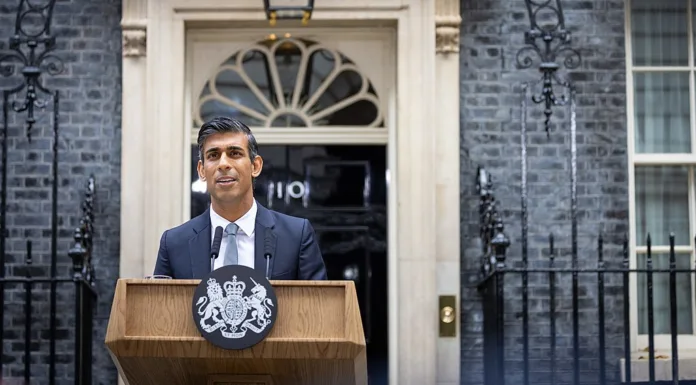The opposition leader calls out Labour’s budget strategy, claiming it strays far from commitments made during the general election
In a fiery speech this week, Rishi Sunak, the Leader of the Opposition, did not hold back as he accused Labour’s Shadow Chancellor, Rachel Reeves, of reneging on critical election promises regarding taxation. Sunak’s comments come in the wake of the government’s latest budget announcement, which he claims is riddled with “broken promises” that will have significant implications for the British economy.
Standing outside the House of Commons, Sunak articulated his concerns, saying, “This Budget is proof that Labour plans to tax, borrow, and spend far beyond what they promised during the general election.” His tone was sharp, reflecting his belief that the current government is abandoning its responsibilities to the electorate. He further accused Labour of “fiddling the fiscal rules,” a term he used to describe what he sees as manipulative budgeting tactics that ultimately undermine economic stability.
Sunak’s critique of the budget, which he believes has veered away from the principles of fiscal responsibility, highlights his broader concerns about the Labour Party’s economic strategy. He argued that the increased borrowing and “inflation-busting handouts” primarily benefit trade unions rather than ordinary citizens. The implication is clear: Sunak believes that these financial decisions are not merely misguided but also potentially damaging to the economic fabric of the nation.
Embed from Getty ImagesHis remarks come at a time when public trust in government spending and taxation is under scrutiny. In recent months, many families have felt the strain of rising costs, and Sunak claims that Labour’s decisions will only exacerbate these issues. He pointed to the financial burdens that households face as evidence that the government is out of touch with the realities of everyday life for many Britons.
In his speech, Sunak provided specific examples of the tax changes he believes will adversely affect working families. He emphasised that the proposed increases in tax rates, coupled with cuts to essential services, could lead to dire consequences for those struggling to make ends meet. “Hardworking families will bear the brunt of Labour’s fiscal irresponsibility,” he stated, casting a shadow over the government’s ability to deliver on its promises.
This intense back-and-forth between Sunak and Reeves underscores a growing tension in UK politics as both parties prepare for an impending election. The battle for public opinion is fierce, with each side vying to demonstrate its commitment to fiscal prudence and economic growth. For Sunak, the opportunity to capitalise on what he perceives as Labour’s missteps is too significant to overlook.
As Sunak rallied his party members, he urged them to unite against what he called Labour’s “betrayal” of the electorate. “We must stand firm in our resolve to protect families and ensure that the burden of taxation does not fall disproportionately on those who can least afford it,” he declared passionately. His call to action resonated with many within his party, who share his concerns about the implications of Labour’s proposed financial policies.
THE INDEPENDENT
Keir Starmer has set a serious tone, stating that the government will embrace the “harsh light of fiscal reality.” In a bid to address the UK’s economic challenges, the budget is expected to include a rise in employer national insurance contributions and an increase in the single bus fare cap from £2 to £3, which aims to help low-income communities reliant on public transport. However, the proposed fare hike has faced backlash, with many fearing it will exacerbate financial pressures on vulnerable populations.
Starmer’s administration has committed to raising taxes, particularly targeting the wealthy, amidst concerns over the potential loss of public trust due to breaking previous promises. Economists suggest that increased government revenues are vital to improve public services and reduce a £22 billion fiscal gap left by the previous government. With the tax burden reaching levels comparable to EU averages, Reeves aims to demonstrate that Labour can manage finances effectively while investing in public services.
Despite the government’s efforts to manage perceptions, scepticism remains, particularly given the recent rise in gilt yields, raising questions about market confidence in the government’s fiscal strategy. The upcoming budget will thus be a pivotal moment for Labour, testing both its economic policies and the public’s faith in its leadership.
BBC
Leader of the Opposition Rishi Sunak has fiercely criticized the government’s budget, describing it as “broken promise after broken promise.” He accused Labour of significantly deviating from their election commitments, asserting that the budget reveals their intention to “tax, borrow, and spend far beyond” what was previously outlined.
In a pointed address, Sunak highlighted key issues, stating, “Today’s Budget sees the fiscal rules fiddled, borrowing increased by billions of pounds, and inflation-busting handouts for the trade unions.” His remarks reflect a broader concern within the Conservative Party regarding Labour’s fiscal management and potential impact on the economy.
The opposition leader’s critique underscores a growing rift between the two parties, with Sunak positioning himself as a defender of fiscal responsibility amidst rising public scrutiny of Labour’s proposed tax increases and spending measures. As the government faces criticism from both sides, Sunak’s statements are likely to resonate with constituents worried about the implications of increased borrowing and potential tax burdens.
